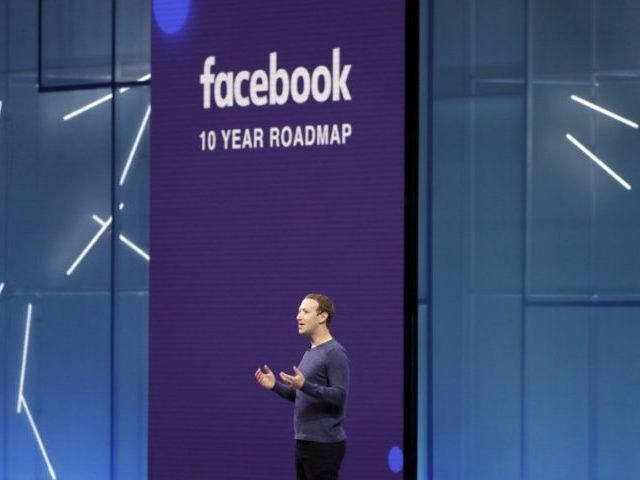Breitbart News senior tech reporter Allum Bokhari, who recently uncovered Facebook’s process of labeling its users “hate agents,” elaborated on his exclusive report and how he expects it to evolve in a Friday interview with SiriusXM’s Breitbart News Daily host Alex Marlow. Bokhari pointed out the striking similarity between the Silicon Valley Masters of the Universe and the Chinese government, which has implemented a “social credit system” in an effort to train its citizens to behave in a manner that pleases the communist regime.
“One of the things they say is that if you do something in private that later becomes public, and they consider it ‘hateful,’ they’re going to count that against you,” said Bokhari, “So even your private behavior is now going to be under scrutiny.”
“As we saw a couple of weeks ago, Facebook is happy to give left-wing journalists private information about users to help them write their hit pieces,” added Bokhari, “They gave The Daily Beast information about a supposedly Trump-supporting forklift driver who shared a meme about Nancy Pelosi.”
Listen below:
“They’re part of making stuff that is private conversations part of the public record,” said Marlow, who also noted that this apparent effort by social media companies to train the public on how to behave also extends beyond one’s own behavior, to the behavior of someone else whom they might come in contact with.
“Just by interviewing and challenging people who have viewpoints that are resonating with people, even if you and I find those views disgusting — you can’t even interview them to challenge them without having that added to your ‘score,'” said Marlow.
Bokhari also noted the striking comparison that these big tech social media companies have to China’s “social credit system.”
The comparison to China is a good one, I think, because in China, they have what’s called a “social credit system” — in which, if you engage in behavior that the regime doesn’t like, they’ll assign you a score, and when it drops below a certain point, they’ll exclude you from certain basic services, like transportation, they might not let your kids go to good schools — all sorts of basic services, they’ll cut you off from.
We have a corporate version of this already evolving. So if you don’t do the things that Facebook approves of, they’re going to cut you off from their platform, which is now essential for maintaining a social network, building a business, running for office. We rely on Facebook and other social media platforms for so many things. Uber and Lyft will also ban you now — they’ve started to ban people for political viewpoints, so you think China is the only one that’s going to cut you off from transportation for having the wrong opinions — well, Western corporations are now doing that, too. Airbnb, Amazon, they’re all doing it.
“There were queues at train stations by concerned members of those [Hong Kong] protests who were worried that they’ve been banned from transport for protesting against the government,” said Bokhari of Hong Kong citizens who had recently protested extradition laws, “We’re not at that level just yet, but Uber, like I’ve said, has started banning people for their political viewpoints.”
“Once they get to Facebook’s level, they will start banning people for attending the wrong political rallies,” added Bokhari, “It’s not hard to see that happening — again, these corporations behave as a pack, they have this thing called ‘indiscreet,’ their ‘best practice,’ when one company does it, other companies follow.”
“Even at restaurants now,” added Marlow, “If you make a reservation, they’re searching you out on the Internet, and I’m guessing they’re doing this to kind of identify social media influencers, to give them a free cocktail or something to get a good post, but who’s to say this isn’t going to turn into, ‘you’re not welcome here.'”
“I believe we are entering an era of political segregation in the economy,” said Bokhari, “and I think that’s why things like Harmeet Dhillon’s lawsuit against Google — which is brought on their basis of the company discriminating against conservative and non-progressive employees — is so important.”
“And I think if everyone would like to stop this from spiraling out of control, you do need some protections for political viewpoints beyond California — where that lawsuit is being brought — and across the country, because otherwise it will get worse,” affirmed Bokhari, “Partisanship is increasing.”
“And the flip-side of giving an influencer a free drink is banning the controversial person from your business,” he added.
It was also mentioned that while some people may be hopeful of the rise of alternative platforms, there is still a lot of headway that needs to be made, which is especially difficult when competing with monopolies.
“It’s certainly worth creating accounts on the alternative platforms, and posting on there, and giving them content,” said Bokhari, “and hopefully they’ll eventually grow to compete with the likes of Facebook, but they’re a long way from doing that yet, because there’s just so much ground to catch up with.”
“You have to remember that social media companies are kind of a natural monopoly,” added Bokhari, “because no one wants to be in a social network that doesn’t have many people on it — the value of a social network is based on the number and the quality of people that they have, which gives the established players a huge advantage.”
You can follow Alana Mastrangelo on Twitter at @ARmastrangelo, on Instagram at @alanamastrangelo, and on Parler — a new alternative social media platform — @alana.

COMMENTS
Please let us know if you're having issues with commenting.